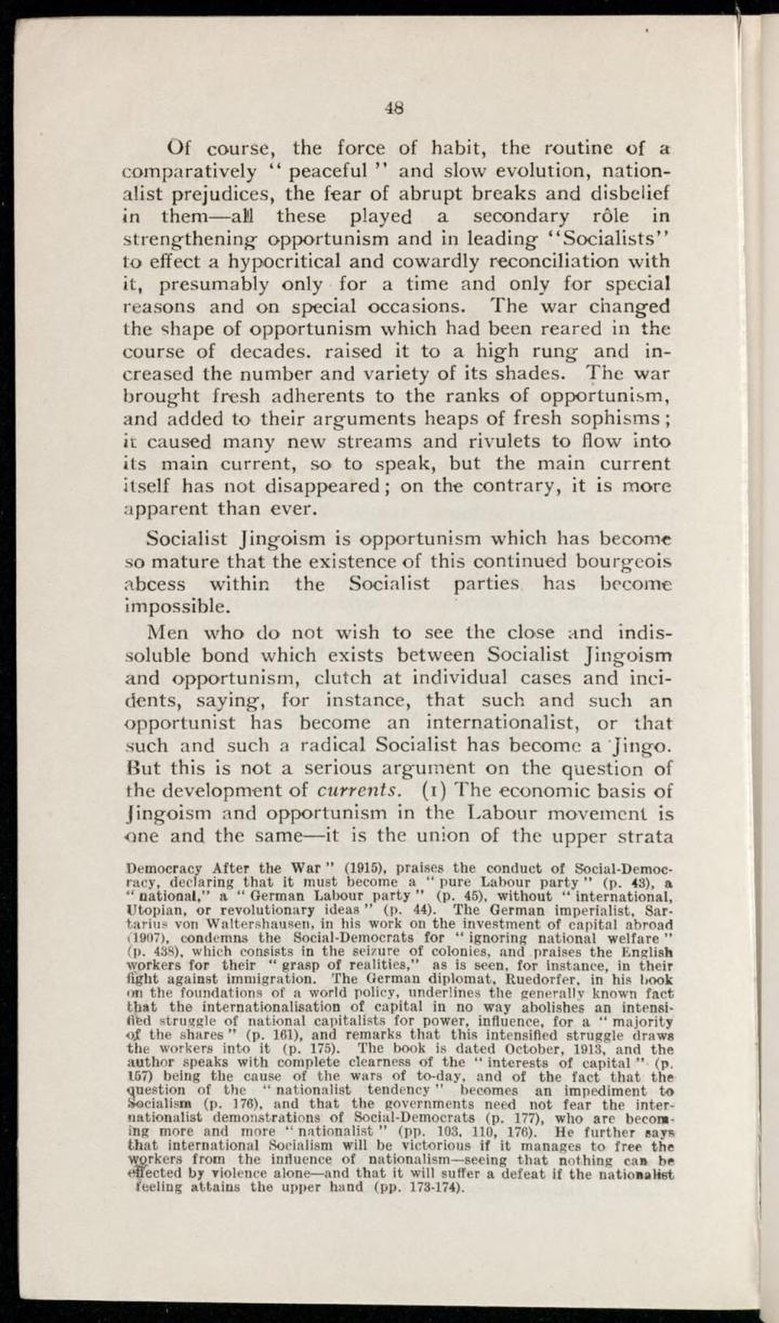48
Of course, the force of habit, the routine of a comparatively “peaceful” and slow evolution, nationalist prejudices, the fear of abrupt breaks and disbelief in them—all these played a secondary rôle in strengthening opportunism and in leading "Socialists" to effect a hypocritical and cowardly reconciliation with it, presumably only for a time and only for special reasons and on special occasions. The war changed the shape of opportunism which had been reared in the course of decades, raised it to a high rung and increased the number and variety of its shades. The war brought fresh adherents to the ranks of opportunism, and added to their arguments heaps of fresh sophisms; it caused many new streams and rivulets to flow into its main current, so to speak, but the main current itself has not disappeared; on the contrary, it is more apparent than ever.
Socialist Jingoism is opportunism which has become so mature that the existence of this continued bourgeois abcess within the Socialist parties has become impossible.
Men who do not wish to see the close and indissoluble bond which exists between Socialist Jingoism and opportunism, clutch at individual cases and incidents, saying, for instance, that such and such an opportunist has become an internationalist, or that such and such a radical Socialist has become a Jingo. But this is not a serious argument on the question of the development of currents, (1) The economic basis of Jingoism and opportunism in the Labour movement is one and the same—it is the union of the upper strata
Democracy After the War" (1915), praises the conduct of Social-Democracy, declaring that it must become a "pure Labour party" (p. 43), a "national," a "German Labour party" (p. 45). without "international, Utopian, or revolutionary ideas" (p. 44). The German imperialist, Sartarius von Waltershausen, in his work on the investment of capital abroad (1907), condemns the Social-Democrats for "ignoring national welfare" (p. 438), which consists in the seizure of colonies, and praises the English workers for their "grasp of realities," as is seen, for instance, in their fight against immigration. The German diplomat, Ruedorfer. in his book on the foundations of a world policy, underlines the generally known fact that the internationalisation of capital in no way abolishes an intensilifed struggle of national capitalists for power, influence, for a "majority of the shares" (p. 161), and remarks that this intensified struggle draws the workers into it (p. 175). The book is dated October, 1913, and the author speaks with complete clearness of the "interests of capital" (p. 157) being the cause of the wars of to-day, and of the fact that the question of the "nationalist tendency" becomes an impediment to Socialism (p. 176), and that the governments need not fear the internationalist demonstrations of Social-Democrats (p. 177), who are becoming more and more "nationalist" (pp. 103. 110, 176). He further says that international Socialism will be victorious if it manages to free the workers from the influence of nationalism—seeing that nothing can be effected by violence alone—and that it will suffer a defeat if the nationalist feeling attains the upper hand (pp. 173–174).
